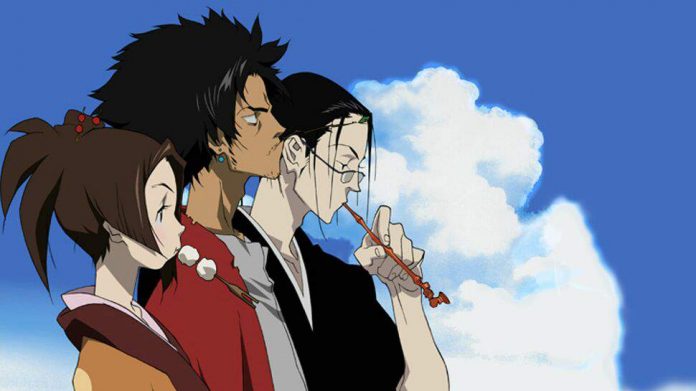It’s crazy to think about, especially since it had another run on Toonami a few years back, but 2019 marks the fifteenth anniversary of the street-smart anime classic, Samurai Champloo. Its unique fusion of warring States-era Japan with the modern stylings of hip-hop culture set Samurai Champloo apart from most anime. I can’t say I consider it a masterpiece, but it’s probably the most important anime personally.
This year's the 15th anniversary for Samurai Champloo – and you can get ALL of Samurai Champloo now on Blu-ray & Digital! https://t.co/RloC4ZMeLc pic.twitter.com/Z8K0G87lLV
— Funimation (@Funimation) February 6, 2019
Growing up as a black nerd was a strange and somewhat lonely experience. Even though I grew up in an era where liking Toonami was considered to be “normal” on the nerd scale, I still felt like a complete outcast. When conversing with others, it became evident that my two biggest loves, anime and hip-hop, were conflicting points of interest — all of my friends that loved to watch anime and Toonami hated hip-hop. On the flip side, my friends who were big hip-hop heads only messed with Dragon Ball Z and nothing else. I was always “the odd one out” due to my eclecticism, and couldn’t find many people who shared my same passion for Japanese animation beyond Toriyama and the four pillars of hip-hop (DJing, breakdancing, graffiti, and rapping).
Being young and malleable, fear of not fitting in was pushed onto me a lot by society, and it legitimately scared me. Soon enough, I began to wonder if I should give up one of my loves, or at the very least, put one on the backburner. Because my surrounding environment at the time was a predominantly black demographic, and most of the folks my age fell into the “hip-hop and very little anime” category, my interest in anime slowly began to wane. I still kept up with Toonami because I loved TOM, SARA, and all the cool packaging, visuals, and music videos that came with it, but my love was nothing like it used to be.
Little did I know that in 2005, my entire perspective would flip on its head.
Nearly everyone that grew up in the early 2000s can relate to the feeling of sneakily staying up late to watch [adult swim] behind their parents’ backs. Many nights of InuYasha, Cowboy Bebop, and Yu Yu Hakusho contributed to sleepy Sunday mornings during church and lots of trouble with my parents. I always loved staying at my cousin’s house because they rarely went to church and it gave me the opportunity to stay up as late as I wanted (like the little rebel I was). In particular, one night was utterly unforgettable, and I was never happier to be spending time with my cousin.
My cousin was one of the few people I knew that liked both hip-hop and anime immensely. We had similar tastes. So watching [adult swim], especially on Saturday Nights, was pretty much customary for us. It started as a typical night. We were staying up late, keeping each other awake, dancing to the various anime openings and endings. We took a look at the TV guide to see what was coming next and saw an unfamiliar show called Samurai Champloo. We had no idea what to expect, but we were both massive fans of Rurouni Kenshin, so anything that had the word “samurai” in it was welcome in our eyes. We were instantly mesmerized with what we saw.
We weren’t greeted with some cheesy American pop or generic Japanese pop rock as soon as the opening began. What awaited us was a smooth, downtempo hip-hop beat produced by the great Nujabes. A couple of “wow, what?” exclamations were uttered under our breaths as we listened intently, slowly starting to nod our heads to the beat. The quiet curiosity turned into genuine excitement when the MC swooped in with:
“Sharp like the edge of a samurai sword / The mental blade cut through flesh and bone / Though my mind’s at peace, the world out of order / Missing the inner heat, and life gets colder.”
We couldn’t believe our ears. What we heard was nothing like the typical 90s/2000s trying-too-hard-to-be-edgy-and-cool rap that plagued a lot of English edits of anime. We were listening to pure hip-hop. My cousin and I were dumbfounded when the track ended. We just stared at each other like “Wow…that was a real rap song, wasn’t it?” We had never heard anything like it, and we never thought we’d see the day. We were hooked and kept watching the series to see if there would be more. As the show played on, we were beaming. Graffiti, Mugen’s breakdance fighting style, more smooth beats from Nujabes, and even little things like transitions involving turntable record scratches gave the series flavor we never thought we’d see in an anime. Not only did we get yet another dope samurai anime, but we also got a love letter to the hip-hop culture we adored so dearly.
I came back home to my fellow hip-hop heads who were down with Dragon Ball Z and told them all about Samurai Champloo. At first, they didn’t believe me when I said it was a hip-hop samurai series, but they came back the next week telling me they watched and loved what they saw. Eventually, they came to me asking for other anime recommendations afterward taking away the feeling that I didn’t belong anywhere. I finally had more like-minded friends that I could talk about hip-hop and anime at any point in time. My passion was reignited, and I expanded my social world in the process. Samurai Champloo successfully did something I thought was impossible: it helped bridge the gap between the rap-fanatic “street kids” and the anime-loving “nerds.”
Samurai Champloo isn’t my all-time favorite anime, but it’s a solid one that has had the most impact on me. It was amazing to see the slight impact this series had on other productions. It made me happy that another anime production, Afro Samurai had an entire hip-hop score (produced by Wu-Tang Clan member The RZA) for one example. Of course, I can’t forget The Boondocks, and the massive influence creator Aaron McGruder took from Samurai Champloo. The first season’s intro sequence took direct inspiration from the series, and that was the first thing that caught my eye. And the influences didn’t just stop there. Just as an example, season 3 episode “The Red Ball” being heavily based off of my favorite Samurai Champloo episode, “Baseball Blues” gave me the biggest smile on my face.
On the musical side of things, while the late J. Dilla inspired many other producers, I found much more creative inspiration through Nujabes (coincidentally both producers were born on the same day). There was something about Nujabes’ jazzy style and unique chill sound that resonated with me much more than any producer I had heard at the time. Hours upon hours of my teenage life were spent vibing to the serene sounds of his instrumentals and studying the intricate sampling. As one of my biggest musical inspirations, it goes without saying that when the news broke that Nujabes met his untimely end in a fatal car crash, I was profoundly troubled.
Happy birthday to the late Nujabes, a great producer who blessed us with the beats behind Samurai Champloo and much more pic.twitter.com/swROmPbsqr
— Funimation (@Funimation) February 8, 2019
It’s safe to say that if it wasn’t for Samurai Champloo, I don’t think I would still be into anime. Samurai Champloo finally gave me common ground for my two most significant interest that felt worlds apart. It was the first anime I felt was made for me. Even my current best friend, not knowing the impact the series itself had on me and only remembering the stuff I was interested in, told me that Samurai Champloo was the “most [me] anime ever made.” It gave me and another black nerd/hip-hop head hybrids a place to belong. Even after fifteen years, from sunup to sundown, we will always be “sons of a battlecry.”
Alien.Renegade is a writer and reviewer for Toonami Faithful, a Toonami-styled video editor, and the creator of many Toonami-inspired tracks. You can follow him on Twitter @AlienRenegade

